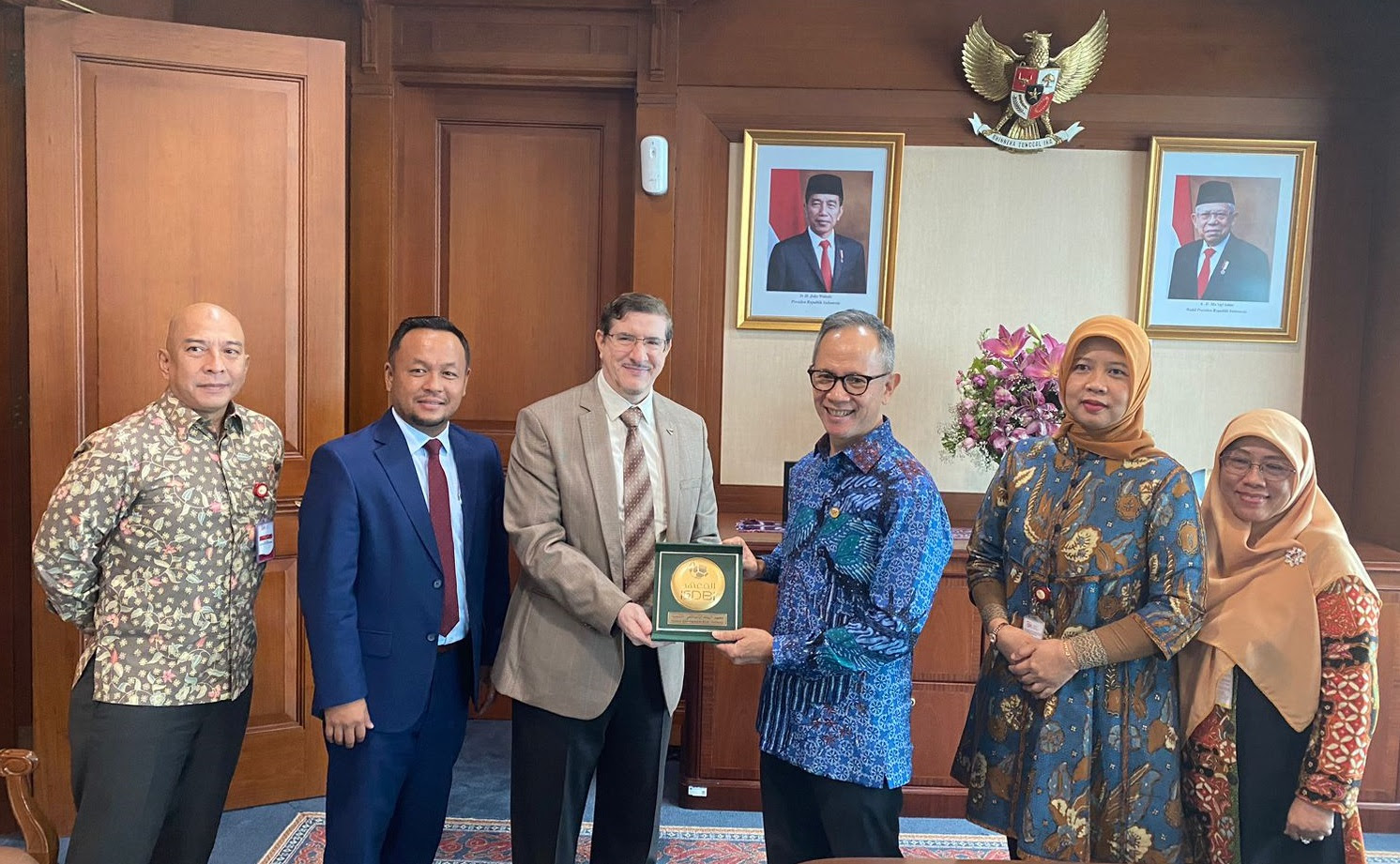| CAPE TOWN, South Africa, October 31, 2023/ — Mining Indaba understands how important ESG is to the mining industry, two years ago we introduced the Junior ESG Awards to recognise and honour junior mining companies that are striving to achieve positive impacts related to their companies’ sustainable development. This initiative provides a platform for juniors to share their initiatives in order to be recognised for their excellent achievements while inspiring peers to do the same.
Rebranded the Responsible Resourcing Awards, Mining Indaba will continue to honour junior mining companies for their sustainable development initiatives. These awards promote a more ethical and sustainable future in and for the industry and the greater economies they have a presence in. Previous recipients have been recognised for initiatives including reducing carbon emissions, improving access to clean water, and promoting sustainable economic development in their regions. Their innovation and dedication contribute to a more sustainable future. Junior miners are transforming responsible mining by preserving the environment, supporting local communities, and promoting sustainable, ethical practices in the industry through their innovative approach. The Responsible Resourcing Awards cover a variety of aspects of sustainable mining including:
For its innovative and revolutionary climate-change initiatives, such as green power solutions, nature-based solutions, and re-designing mining infrastructure to address environmental, social, and economic issues.
A company is recognised for improving clean water access, introducing innovative solutions for pollution prevention, and responsibly managing water usage in projects and asset operations.
A company promoting sustainable economic development in local communities, focusing on vulnerable groups, reducing dependency on mining, and promoting the green economy.
A company is recognised for integrating circular processes into its operations, at any stage of the mining life cycle, and/or into the local economy.
A company is recognised for its exceptional transparency practices and efforts to enhance accountability mechanisms, thereby promoting business integrity and good governance.
A company is focusing on innovative strategies to protect, preserve, and restore ecosystems and species, with a particular interest in collaborative and landscape-level projects.
A company is enhancing local institutions and empowering people to assert their human rights through innovative initiatives and community engagement in decision-making processes.
A company that excels in employment practices, including labour rights respect, equal opportunities, fair treatment, professional development, health and safety culture, and worker voice recognition.
A company is recognised for successfully implementing a diversity, equality, and inclusion strategy, demonstrating improved representation against bias and discrimination, and overcoming discrimination at all organisational levels. The judging process for the Responsible Resourcing Awards involves a carefully selected expert panel of ESG advisors, managers, and analysts. The criteria will include factors such as the level of commitment to sustainability, innovative approaches to environmental responsibility, social impact, and ethical practices. The judges will prioritise entries that demonstrate tangible and measurable results, as well as a clear vision, robust execution, and a lasting commitment to building a more sustainable and responsible future. The deadline for submissions is January 2024. Submit your entry here: https://apo-opa.info/ Distributed by APO Group on behalf of Investing in African Mining Indaba.
For media queries: Sibongile Mtafu |
Category: Sustainability
-
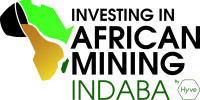
Responsible Resourcing Awards: Acknowledging Junior Miners’ Sustainable Initiatives
-

About Decarbonizing the Aviation Industry
By: Mohammed Abu
Even though the palm oil tree in Malaysia and Indonesia are said to be of West African origin, first introduced as ornamental plants, to the two countries, they have since leveraged research and cutting-edge technologies and maximized economic gains from the tree.
Reuters, Indonesia reports that the country, the world’s leading producer of palm oil, last Friday, flew her first commercial flight using palm oil-blended jet fuel, as she pushes for wider use of biofuels to cut fuel imports.
Garuda Indonesia CEO, Irfan Setiaputra, the report is said to have disclosed that, the flight was operated by flag carrier Garuda Indonesia, the Boeing 737-800NG aircraft carried more than 100 passengers from the capital Jakarta to Surakarta city about 550 kilometres (342 miles) away.
Pertamina, according to the report said, the palm-based fuel emits less atmosphere warming greenhouse gases compared with fossil fuels, and palm oil producing countries have called for the edible oil to be included in feedstock for the production of sustainable aviation fuel (SAF).
“In 2021, Pertamina successfully produced 2.0 SAF in its Cilacap unit using co-processing technology and was made of refined bleached deodorized palm kernel oil with production capacity 1,350 kilolitres per day,” the report quoted Alfian Nasution, a director at Pertamina.
The report added that Harris Yahya, a director at Energy Ministry said the use of biofuel would lower the greenhouse effect.
Historical Antecedents
Indonesia
The first seeds of the oil palm were brought to Indonesia from West Africa by the Dutch and planted in the Bogor Botanical Garden (Java Island) in 1848 (Wahid et al. 2004).
In 2021, the total size of oil palm plantations in Indonesia was around 14.62 million hectares.
Malaysia
Palm oil trees were introduced to British Malaya by the British government in early 1870s as ornament plants from Eastern Region and The Oil River Protectorate, Nigeria, West Africa.
In 1917, the first commercial planting of the oil palm took place at Tennamaran Estate in Batang Berjuntai, Selangor.
In 2021, the size of mature palm oil plantations in Malaysia was around 5.14 million hectares. Fully mature oil palms can produce around 18 to 30 metric tons of fresh fruit bunches per hectare.
Uses and Economic Importance
Widely used in Indonesia for cooking oil and applications such as personal care and cleaning products, palm oil is an important sector in Southeast Asia’s largest economy with the industry employing millions of workers
Palm oil is the main agricultural export of Indonesia and Malaysia, generating 10 % and 5 % respectively of their exports. The sector provides employment for 721 000 smallholders and labourers in Malaysia, and 4 million in Indonesia; a further 11 million in the two countries are indirectly dependent on it.
-
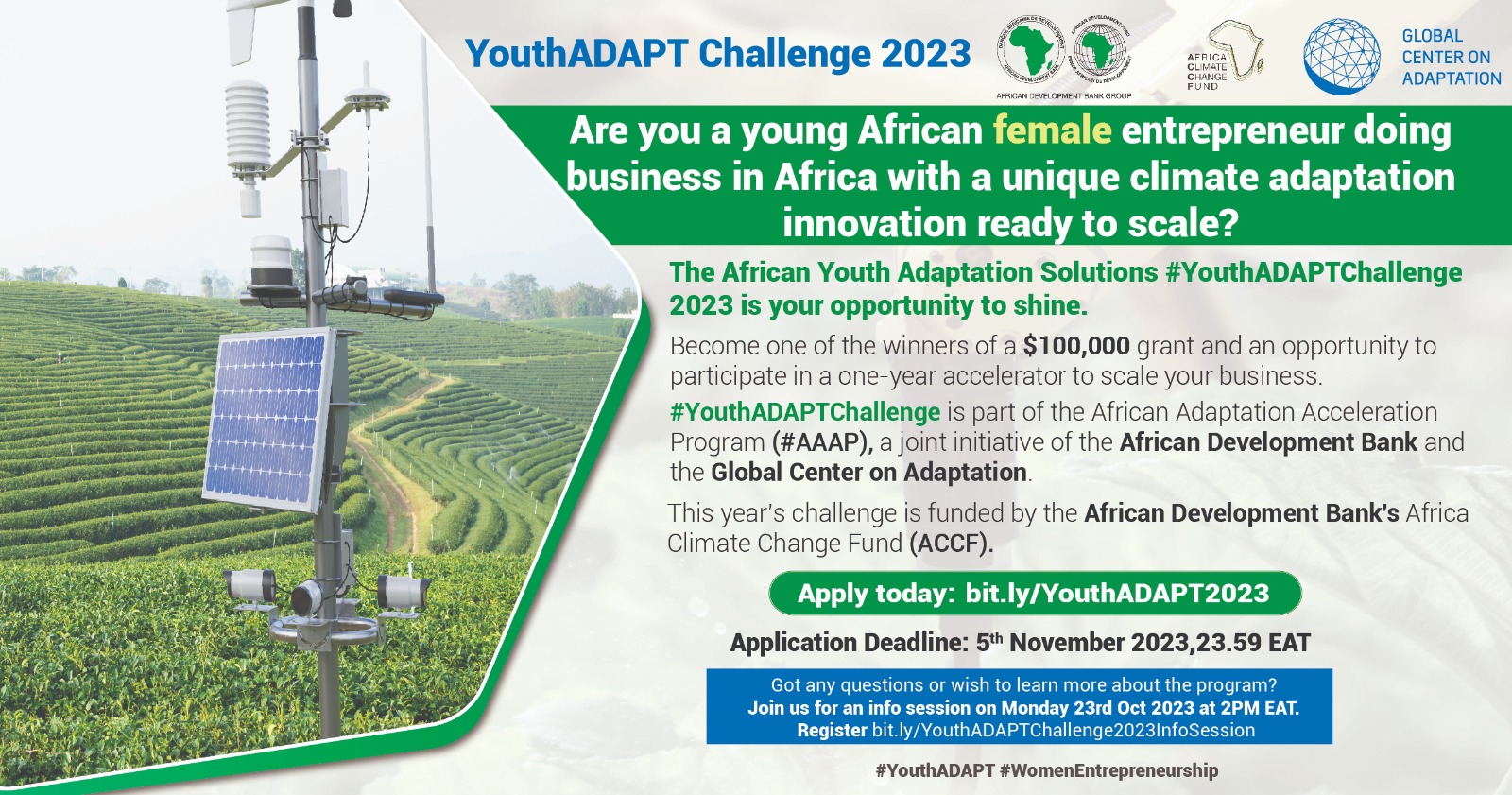
Call for applications – YouthADAPT Challenge 2023: empowering Africa’s female tech innovators to tackle climate change
ABIDJAN, Ivory Coast, October 25, 2023/ — The Africa Adaptation Acceleration Program (https://apo-opa.info/3s7IvoI), a joint initiative of the African Development Bank (http://www.AfDB.org) and the Global Center on Adaptation, has launched a call for applications for the third edition of the YouthADAPT Challenge, which seeks to support young entrepreneurs driving solutions to tackle climate change. The annual YouthADAPT competition invites young entrepreneurs leading micro, small, and medium enterprises in Africa to submit innovative solutions and business ideas that can drive climate change adaptation and resilience across the continent.
This year’s call focuses on female-owned enterprises pioneering Fourth Industrial Revolution technologies such as artificial intelligence; big data analytics; virtual reality; robotics; internet of things; quantum computing; additive manufacturing; blockchain, and fifth-generation wireless for climate adaptation.
With support from the Africa Climate Change Fund (https://ACCF.AfDB.org/), hosted by the Bank, the winners will be awarded $100,000 each, alongside mentorship and coaching to further their climate change adaptation solutions and business ideas. They will also join the YouthADAPT Alumni Network to learn from a dynamic community of youth entrepreneurs throughout Africa.
To be eligible, applicants must be between the ages of 18 to 35. Their ventures should be youth-led and offer tangible solutions to real-life climate challenges. They must be registered and operational in Africa, with at least two years’ worth of accounts.
Apply by visiting the YouthADAPT competition portal (https://apo-opa.info/3Q8WLVZ)
. The closing date for applications is 5 November 2023 at 17:00 GMT. An information session is scheduled for 23 October 2023 at 11:00 GMT to share details about the YouthADAPT Challenge 2023. This session will cover eligibility criteria, the application process, important deadlines, and the advantages of participation, such as grants, mentorship, and business development services. Distributed by APO Group on behalf of African Development Bank Group (AfDB).Contacts:
African Development Bank
Joash Ntenga Moitui,
Communications and Knowledge Management,
Africa Adaptation Acceleration Program
E-mail: j.moitui@afdb.orgAfrica Climate Change Fund
Rita Effah, Coordinator,
Africa Climate Change Fund
r.effah@afdb.orgGlobal Center on Adaptation
Alex Gee,
Head of Communications,
Global Center on Adaptation
E-mail: alex.gee@gca.comSOURCE
African Development Bank Group (AfDB) -

Driving Sustainability in the Hospitality Industry
In a major stride towards advancing sustainability and ESG integration within the hospitality sector, Omnevue, a leading ESG reporting platform, has launched a partnership with The Energy & Environment Alliance (EEA) and official statement disclosed in London,Tuesday.
To mark the beginning of their partnership, they are inviting members of the hospitality industry to a webinar that offers practical advice and tips regarding ESG reporting and the issues surrounding compliance and disclosure.
EEA, the global coalition comprising hospitality and lodging investors, developers, operators, and asset managers, is dedicated to guiding hospitality businesses toward achieving net-zero carbon (NZC) status and excelling in environmental, social, and governance (ESG) leadership.
“ESG reporting is poised to become the defining issue of our time. We can clearly see the transformation taking place, but what’s less clear is the detailed regulatory landscape and how it will reshape organisations. This transformation is on a scale unlike anything senior executives have faced in the past 20-30 years,” remarked Ufi Ibrahim of EEA.
“We are thrilled to unite with EEA in our shared mission to accelerate the sustainability agenda in the hospitality industry and help guide organisations through this transformative period,” said Daniel Jeczmien, CEO of Omnevue. “Together, Omnevue’s cutting-edge ESG reporting capabilities and the EEA’s extensive industry knowledge and passion to help its members attain NZC, will help businesses thrive.”
Omnevue aims to be the ‘QuickBooks for ESG’ through its user-friendly and accessible interface. It seamlessly connects to a company’s financial, HR, and other data sources before collecting, analysing, and generating reports aligned with international accounting standards.
“In response to new regulations, banks, corporates, and investors are now obligated to report on the carbon emissions of the SMEs within their value chains. Omnevue provides the solution that bridges the gap in ESG reporting and data quality,” stated Daniel Jeczmien.
“Our platform delivers accounting-grade data that can be confidently shared with investors, lenders, and customers. We are committed to simplifying ESG reporting for SMEs, making it accessible and cost-effective.”
Webinar: Comprehensive and Cost-Effective ESG Reporting for the Hospitality Sector
Tuesday 31st October 10-11am
Register: https://bit.ly/3QhKf7T
For more information, please visit www.omnevue.com

-
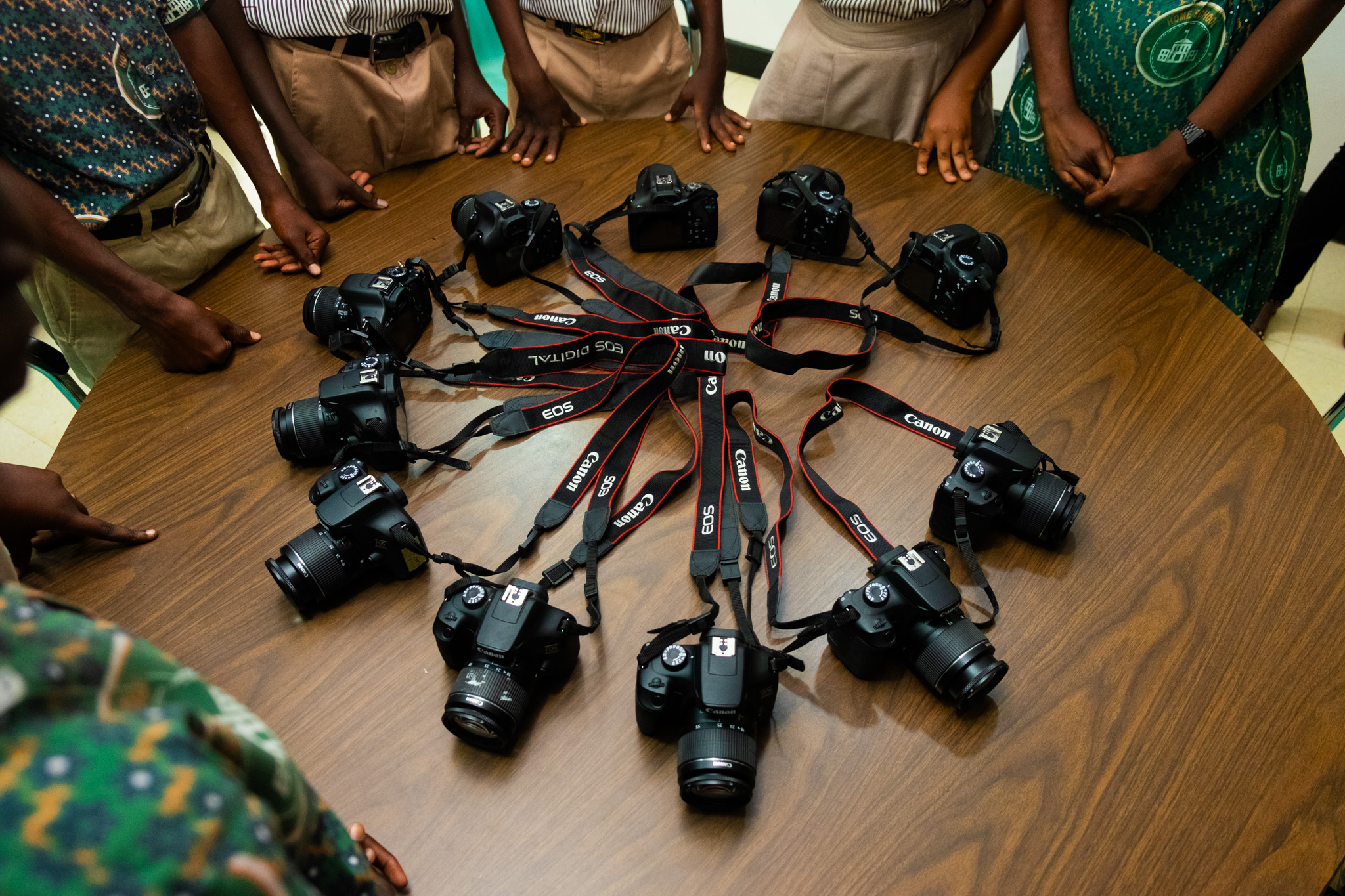
Addressing Africa’s Youth Unemployment Burden
Mohammed A.Abu
Canon has recently added a yet another impressive page to its existing record of youth centred initiatives as parts of its Corporate Social Responsibilities (CSR) in Africa when it announced its partnership with Dikan Center, a visionary non-profit institution based in Ghana, committed to providing visual education.
This major collaboration marks the official launch of the Canon Young People Programme (YPP) in Ghana, with a mission to enable the next generation of creative young people, using their skills to tackle the sustainability issues that matter to them, using creativity and critical thinking.
The introduction of Canon’s YPP in Ghana marks a significant milestone in the country’s landscape. This initiative will offer young people unprecedented opportunities for growth and impact on the African continent.
Through YPP, young creative talent in Ghana can access essential resources, state-of-the-art equipment, and expert training that will empower their storytelling.
This pioneering initiative provides a platform for young people to make their mark on the continent, positioning Ghana as a hub for emerging creative talent. The Dikan Center is renowned for its immersive Gallery, transformative StoryLab Studios, and visual library. Its mission is to foster a culture of curiosity, experimentation, and innovation throughout Africa.
Jeanine El Moughrabi, Sustainability Manager Canon Middle East, and Central & North Africa says, “We are thrilled to embark on this transformative journey with Dikan Center, uniting Canon with Dikan Center’s vision for comprehensive visual education in Africa.
Together, we will empower the next generation to make a significant impact on the African continent. Through YPP, we aim to inspire, educate, and empower these creative young people, enabling them to use their skills and to advocate for positive sustainable change on a global scale.”
Paul Ninson, Founder of the Dikan Center says, “Dikan Center is proud to join forces with Canon’s Young People Programme to expand opportunities for young photographers in Africa.
This collaboration reflects our shared commitment to nurturing creativity and innovation through visual education. Together we will amplify the journeys of emerging visual artists and bring their stories to the forefront.
The Canon YPP initiative aligns seamlessly with our mission to cultivate a culture of curiosity, experimentation, and innovation throughout the continent, and we look forward to the impactful stories that will emerge from this collaboration.”
The collaboration between Canon and the Dikan Center came about through Canon’s recognition of Paul Ninson’s work, the founder of the Dikan Center, and his commitment to empowering the youth in Africa. Canon saw a unique opportunity to align its mission of creating opportunities for young African talent, with the goals of the Dikan Center.
The core of this collaboration is a series of immersive storytelling workshops designed to run every weekend over two months. Local trainers from Ghana, provided by Dikan Center, will work in partnership with Canon, offering resources and essential equipment.
The focus of these workshops is threefold:
Comprehensive Education: Participants will gain insights into the value of sustainability for our future using the framework of United Nations Sustainable Development Goals (SDGs)
Technical Training: Participants will learn the technical side of how to use a camera, receiving training from experts in the field.
Visual Storytelling: The heart of this programme is to empower young people to become storytellers for sustainable change. Participants will choose specific SDGs and capture evocative imagery that convey they personal stories.
The journey will culminate in a professionally curated exhibition, scheduled to be held during a story festival organized by Dikan Center, in December 2023. This platform will showcase the remarkable narratives and perspectives captured by the participants, fostering a profound exchange of ideas and visions. Looking ahead, both Canon and the Dikan Center intend to continue and expand this initiative in the future, creating further opportunities for African talent and collaborations that empower young people to create positive change.
Media enquiries, please contact Canon Central and North Africa
Mai Youssef
APO Group – PR Agency
Rania ElRafie
-
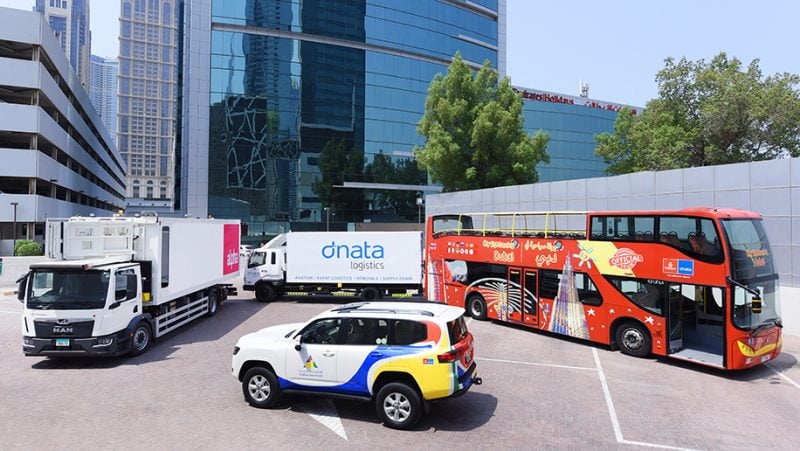
dnata to cut CO2 emissions by 80 per cent in the UAE
Air and travel services provider dnata has taken steps to reduce its environmental footprint across its operations in the UAE.
dnata’s group brands dnata Logistics, Arabian Adventures, Alpha Flight Services and City Sightseeing have switched their vehicles to operate using a biofuel blend.
dnata says that the move will save 80 tonnes of Carbon Dioxide (CO2) emissions per year, equivalent to over 320,000km driven by an average petrol-powered car.
dnata Logistics has switched 31 of its trucks to run on a biofuel blend at its Dubai-based hub. Providing multimodal freight forwarding, logistics, supply chain and road transport services, its trucks cover up to a total 217,000km per month. The move saves almost 35 tonnes of CO2 emissions per year, the equivalent of eight petrol-powered cars driven for one whole year.
City Sightseeing Dubai, a joint venture with dnata Travel Group, operates three tour routes, aiding viewing of Dubai’s top attractions, through the use of 21 open-top, biofueled buses. These cover an average 76,000km per month, removing over 32 tonnes of CO2 emissions each year – the equivalent of the electricity use of four average homes for 12 months.
Alpha Flight Services (Alpha), dnata’s inflight catering joint venture, has already switched five landside vehicles to biofuel blend, and is also in the process of transitioning all of its Sharjah-based airside catering trucks. Alpha now sends its used cooking oil to the biofuel manufacturer and once recycled, it is then reused within its vehicles. One litre of oil recycled into biofuel avoids the emissions of 3kg of CO2, a reduction of 92 per cent compared to diesel fuel use. Alpha’s vehicles cover over 27,000km per month, supporting the company’s catering operations that create over 25,000 meals a day. As a result of the initiative, Alpha will save seven tonnes of CO2 emissions per year, the equivalent of charging over 850,000 smartphones.
Arabian Adventures has also switched the generators at its desert safari camps to a biofuel mix. Arabian Adventures is saving almost five tonnes of CO2 emissions per year as a result of the initiative, equating to 1987 litres of diesel.
Steve Allen, CEO of dnata Group, said, “The introduction of biofuel to a diverse range of our UAE businesses is an important step in our ongoing journey. It offers a simple and effective method of cutting emissions throughout the fuel lifecycle, without requiring any changes to equipment. We will continue to invest in our operations, including large-scale infrastructure solutions, to further enhance our sustainability performance and achieve our green operations targets.”
dnata sustainability initiatives
Dnata’s latest biofuel initiative is part of its efforts to reduce its carbon footprint and waste to landfill by 20 per cent by 2024 in line with its two-year green operations strategy.
In June 2022, dnata said that that it would invest $100m in green operations in two years to enhance its environmental efficiency globally.
The company offers ground handling, cargo, travel, catering and retail services in over 30 countries across six continents. More than 15 per cent of the company’s global fleet is now electrified.
SOURCE
GULF BUSINESS
